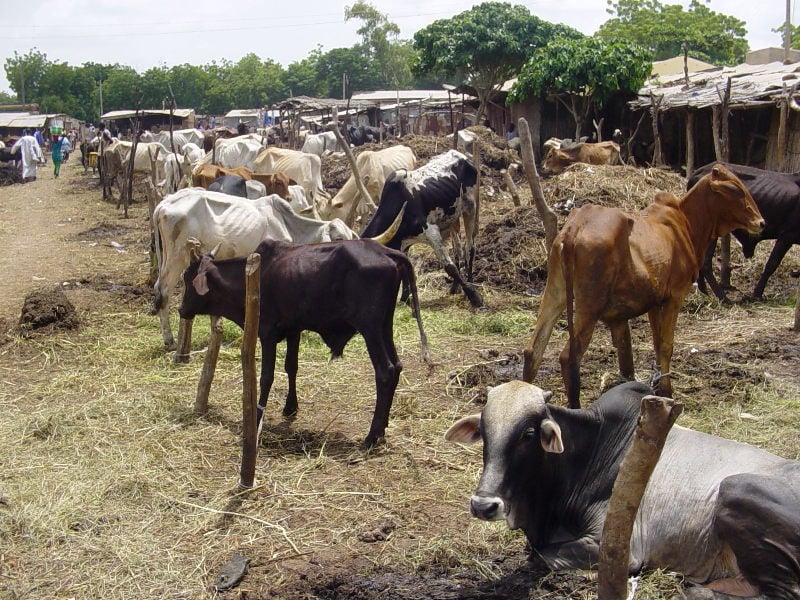BY GABRIEL ONOJA
News that the Nigerian Army has sent soldiers to Argentina to learn cattle ranching was met with derision from some professional commentators who neither took the time to understand the concept or research how it tallies with the overall objective of the military.
Details of the excursion were first made known at the Commissioning of Mogadishu Cantonment New Mammy Market in Abuja where the Chief of Army Staff, Lt Gen TY Buratai was represented by the Chief of Army Logistics, Major General Patrick Akem.
Further revelation from the speech at that event was that the Army under the thorough leadership of Buratai has created the Barrack Investment Initiative under which Army family members are operating fishing ponds, vegetable gardens, fruits, livestock, chicken and eggs production.
Advertisement
As with many other things, this initiative, which should be lauded even without digging into the details have become fodder for armchair analysts that are questioning if learning ranching is the most pressing matter for the Army to expend resources in sending soldiers to Argentina to learn.
Without holding their barrels, the uninformed needless attack on the programme is symptomatic of one of the greatest challenges the nation faces – grandstanding. Many of the self styled critics of government programmes have scant idea about what they are saying including those that carry the label of ‘experts’. Issues are therefore analysed from longstanding ethnic, religious, geographical and political biases that could also be tainted by economic ideology. This has made a mockery of the fabric of the nation where we are supposed to be celebrating genuine efforts that are made to redeem the country from incoherent practices that were deliberately created and institutionalised by the past administrations headed by the Peoples Democratic Party (PDP). Without any fear of contradiction, it is those same characters that messed up the system in exchange for patronage that are today posing as vanguards of national rejuvenation.
In the previous instances, they savagely overlooked and unconscionably turned blind eyes to the fact that the traditional role of a country’s army have mutated significantly to reflect changes that have taken place in the world. As Robert Gates, a former U.S. secretary of defense once said: “One of the most important lessons of the wars in Iraq and Afghanistan is that military success is not sufficient to win: economic development, institution-building and the rule of law, promoting internal reconciliation, good governance, providing basic services to the people, training and equipping indigenous military and police forces, strategic communications, and more—these, along with security, are essential ingredients for long-term success.”
Advertisement
Along this line, sending soldiers to learn about ranching would positon troops involved in the programme to contribute to food security, which is as important as securing the nation from terrorists attacks. Once the trainees are back in the country, it is not conceivable that only the Army will benefit from their acquired skills, which they will be able to teach to populations in areas that are suited for livestock breeding.
As a matter of fact, this would be an army that is not just providing food security but also providing job security for those that would be able to join the industry. This means the army is now looking and operating beyond the tips of their nose. This is selflessly done to add value to life of the ordinary man and create meaningful impact on the lives of those who have been trapped in the jaws of struggle for basic survival and sustainable livelihood.
Additionally, the idea of family members of soldiers being part of the economic programme means that families are not completely left without breadwinners should the head of the family die in the line of duty. This is a well thought-out idea.
Secondly, several persons, including the ECOWAS Parliament had identified ranching as a possible solution to addressing the perennial problems associated with transhumance – the action or practice of moving livestock from one grazing ground to another in a seasonal cycle – which is in part responsible for the farmers/herders’ clashes that has left hundreds of persons dead, displaced and valuable property destroyed as well as eroded basic livelihoods. Not a few people have urged caution while warning against a sledge hammer approach in curbing killer herdsmen.
As attractive as ranching is as a solution to the problem, no one seems to have a grasp as to how to proceed. Where anyone has the sense of what to do, the finances required for commercial scale ranching is one that has not had any serious uptake in spite of the articulation around how it is a solution – no one is certain it will succeed.
Shouldn’t we then be pleased that the army is undertaking a kind of pilot scheme and one that it is not going into blindly by sending its personnel to a country that currently provides beef and beef products to 400 million persons?
Advertisement
If itinerant herdsmen can be made to see the economic benefits of ranching would it not provide a basis for culturally re-orientate them to reassess their nomadic way of life that pitches them against farmers? Would the farmers themselves not consider embarking on small scale ranching that will make their states take firmer stance on cattle grazing since the threat of losing their protein source would have been removed?
When does this patriotic gesture become an audacious avenue for some undesirable elements to cast aspersions on the overall plan that is backed with a mission which has a vision attached to?
Where ranching is demonstrated to be a success and herdsmen resist adopting it is a matter of time before the succulent beef from ranches would put the tough and sinewy cuts from the transit cattle out of the market and the nomads would be forced to admit an end to their era, which would also end the orgy of killings that has unfortunately left the nation traumatized.
Furthermore, at a time the country is resolute on exploring new revenue sources towards diversification from being a mono-economy that was vertically and horizontally built on the structures of oil, developing skills in ranching and actually setting up ranches across the country as being implemented presently has the potential for making Nigeria to join the league of nations that exploit livestock products.
Advertisement
We must also face the reality that with the capture of Boko Haram camp in Sambisa forest, it is a matter of time before we begin to start having a peacetime army. Some nations have their army engineering corps building their roads and public infrastructure, others deploy their military for disaster response; we must accept the reality.
Our gallant and internationally recognised have taken it upon themselves not only to be engrossed in the task of security our territorial unit also to secure livelihoods. This is a commendable gesture that must be given a standing ovation and not some sort of illicit condemnation. We have to deploy our troops to provide food security for the nation. The lame argument canvassed by some commentators that no other country has committed its army to this kind of role is not acceptable since it implies a resignation to playing catch up on all matters. There is nothing to be lost in Nigeria blazing the trail in having an army that impacts life by providing abundant food.
Advertisement
Even as some uninformed critics have gone to town poking fun at this laudable initiative, one can only hope that it succeeds on a scale that is replicable and adopted by commercial livestock farmers. What is today the butt of jokes would turn out to be the masterstroke needed to nudge us towards self sufficiency in food production. When that time comes we as a people of goodwill or conscience and such infamous critics should be humble enough to acknowledge the timely necessity of the revolutionary thinking championed by General Buratai.
Onoja is Executive Direction, Coalition Against Terrorism and Extremism and contributed this piece from Jos
Advertisement
Views expressed by contributors are strictly personal and not of TheCable.
1 comments







The Nigerian Army should be trained in all kinds of entrepreneurship for them to be people s army. Please COAS have a relook at the post service agricultural potential at Ipaja and Kachia resettlement centers. We can help should reactivation be considered.